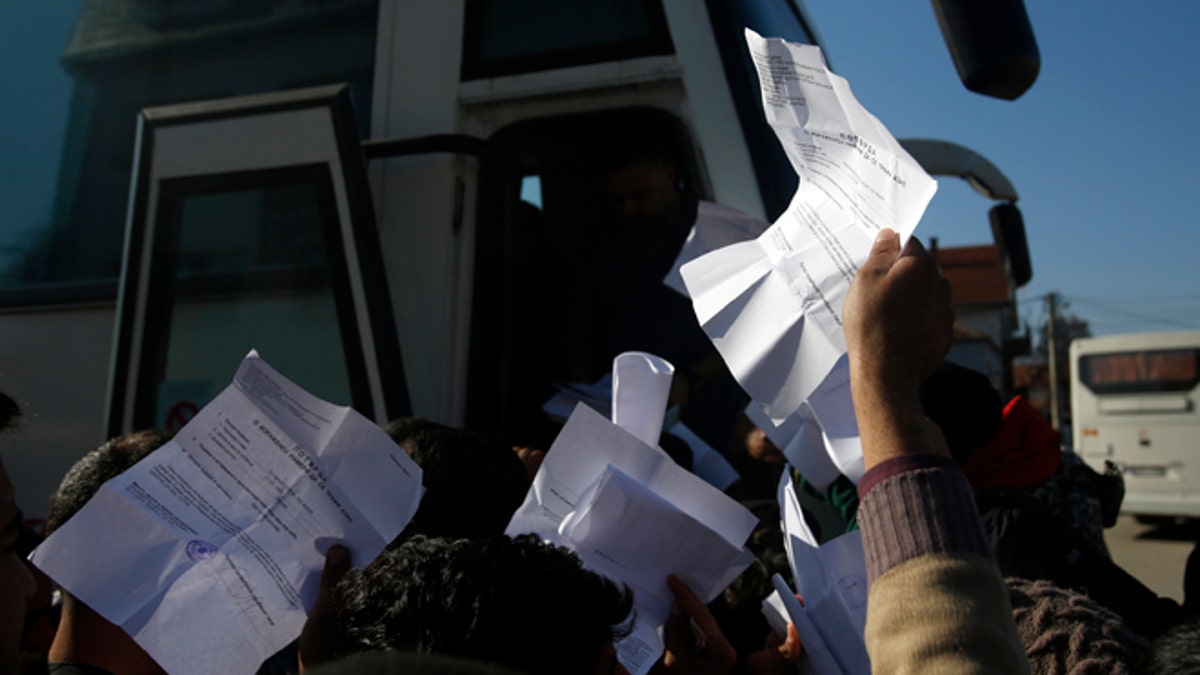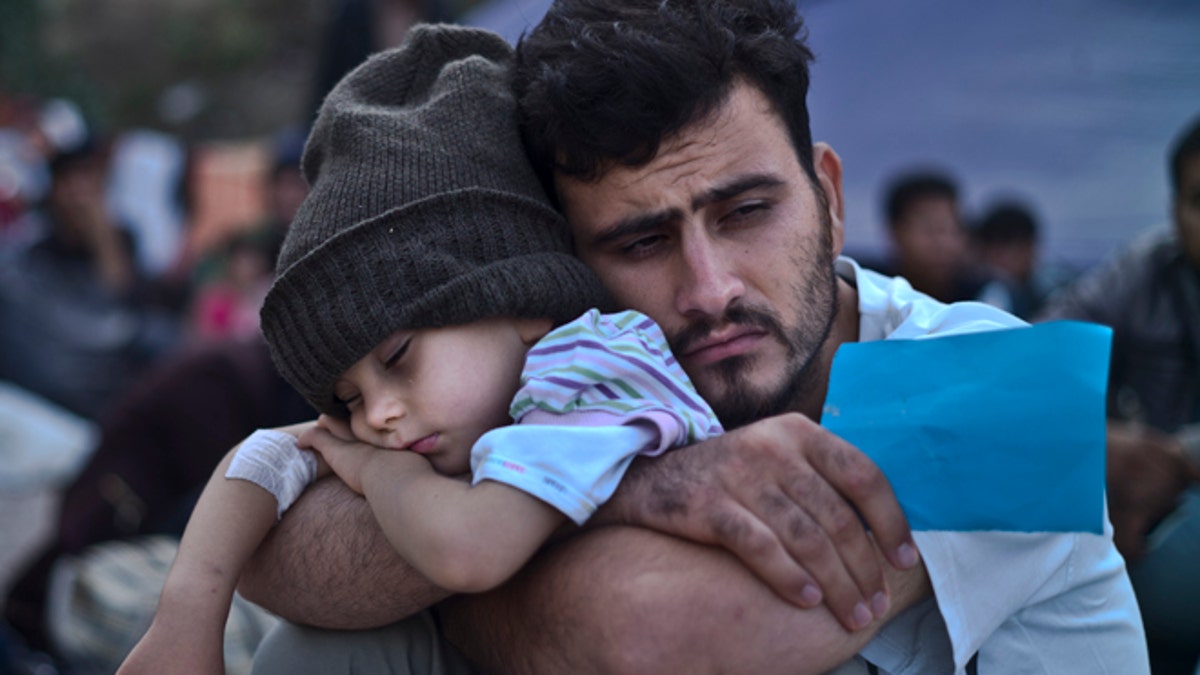
Migrants showing registration papers issued by Serbian authorities, try to get a seat on a bus in the southern Serbian town of Presevo. (AP)
President Obama declared Monday that there should be no religious test for refugees fleeing a bloody Syrian civil war and the expanding reach of ISIS, but critics contend the current refugee placement process is rigged against Christians.
While Christians accounted for about 10 percent of the Syrian population in 2011 and face greater peril as a religious minority in a mostly Muslim region, fewer than 3 percent of the 2,187 refugees relocated to the U.S. since January 2011 are Christians, and the percentage of Christians granted asylum in 2015 has shrunk below even 2 percent. The main reason appears to be that once Christians escape the Assad regime's barrel bombs and Islamic State's brutal caliphate, they must navigate a hazardous refugee process fraught with gangs, sex trafficking and bureaucratic bias.

FILE - In this Sunday, Oct. 4, 2015 file photo, a Syrian refugee child sleeps in his father's arms while waiting at a resting point to board a bus, after arriving on a dinghy from the Turkish coast to the northeastern Greek island of Lesbos. Bold ideas for helping Syrian refugees and their overburdened Middle Eastern host countries are gaining traction among international donors who were shocked into action by this year's migration of hundreds of thousands of desperate Syrians to Europe. (AP Photo/Muhammed Muheisen, File) (AP)
“America was created as a land for religious freedom, and if these individuals are persecuted for their faith, we as a beacon of hope for the world should understand their pain more than anybody else,” Juliana Taimoorazy told FoxNews.com. Taimoorazy is a fellow at the Philos Project and the president of the Iraqi Christian Relief Council.
“We should take our history and what we’ve stood for into consideration and accept them,” she said.
The Syrian civil war began in the spring of 2011 and, since that year, the U.S. has accepted more than 2,187 refugees, but only 61 Christians. The majority – 96 percent – are Muslims, mostly Sunni, while the another 25 refugees are a mix of atheist, no religion, other, Bahai, Yazidi or Zoroastrian. In 2015, the U.S. allowed in the bulk of its refugees – 1,829 – but only 30, or 1.6 percent, were Christian.
“We as a beacon of hope for the world should understand their pain more than anybody else”
The Obama administration has announced plans to take in 10,000 more Syrian refugees during the next year. But reports that some of the Islamists who launched Friday's deadly attack on Paris may have used refugee status to gain admittance to Europe have provided ammunition for those who disagree with the plan. At least 29 governors have said since the attacks that they oppose bringing Syrian refugees to the U.S.
“We have to look at the conditions of these people,” Taimoorazy said. “Arabs can easily go to Saudi Arabia or to other Islamic places that will take them. But Christians that are persecuted at the hands of these Muslims have been persecuted because of their faith. It’s cultural genocide and it’s religious genocide.”
Part of the reason for the low numbers of resettled Christians in the U.S. may be that most Christians fleeing ISIS in Syria do not make their way into United Nations camps.
“Those camps are infiltrated by ISIS and jihadist groups,” said Nina Shea, the director of the Center for Religious Freedom and an international human rights lawyer. “The women would be vulnerable to rape and sex trafficking and the men would have to swear allegiance to the caliphate, according to aid people who have been in the camps.”
But the camps are the easiest way for migrants to register with the UN as refugees, Shea said. There is a heavy UN High Commission for Refugees presence in the camps, and simply gaining refugee status is the first crucial step in the long process of resettling.
“The UN is basically unloading; it’s emptying out its camps,” Shea told FoxNews.com. “It’s not seeking those who are outside its camps, much less giving affirmative action for those who are facing genocide. It’s just an expedience measure for those who are in their own camps, so non-Muslim minorities are poorly represented among them.”
Both Shea and Taimoorazy said Christians living outside the camps face challenges gaining refugee status, a sentiment echoed by Jen Smyers, director of policy and advocacy with the Immigration and Refugee Program at Church World Service.
“Sometimes an officer will go out and try to make connections,” Smyers told FoxNews.com. “But I think certainly if you can’t find UNHCR presence you are at a disadvantage.”
The UNHCR identifies refugees “based on vulnerability, which may include belonging to a religious or ethnic minority,” according to a State Department official. Once an applicant gains refugee status, they are referred by the UNHCR to one of the refugee resettlement countries. It’s only at this point the U.S. begins its role in the process, vetting each applicant.
“Our emphasis is on admitting the most vulnerable Syrians – particularly survivors of violence and torture, those with severe medical conditions, and women and children – in a manner that’s consistent with U.S. national security,” State Department spokesperson Julia Mason told FoxNews.com.
But Shea said those most vulnerable Syrians often never make it onto the U.S. radar.
“The people that have suffered the most,” she said, “are being completely dealt out of the deck of the refugee program.”
